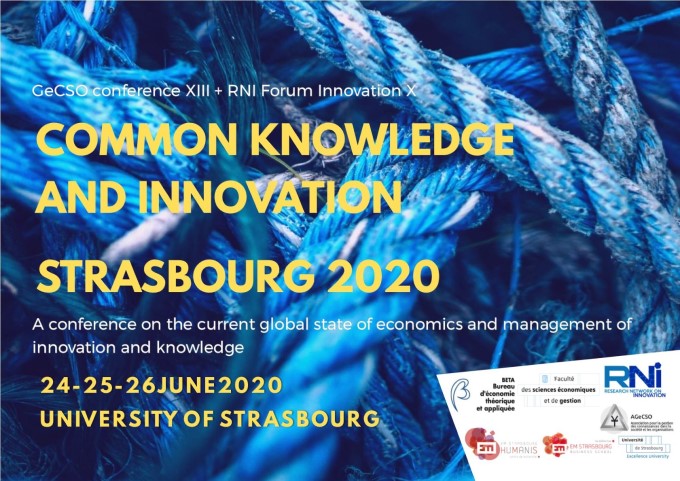
Call for papers > Session presentationContributions are expected to be on the economy and the management of innovation and knowledge. The submission must be in one of the following 12 sessions: 1. Economics and Management of innovation(Generalist Session, in French or English) 2. Smart cities
(Thematic session, in French or English) This special session proposes, through the prism of knowledge management theories, to contribute to recent debates on smart cities issues (Ismagilova et al., 2019, Israilidis et al., 2019). Submitted papers will aim to show how the knowledge management approach is enriching the literature on digital innovations that are developed and diffused in smart cities contexts, and is defined as a 'product, process or new business model incorporated or driven through ICTs" (Fichman et al., 2014, p.333). Submitted papers could focus on one of the different smart cities’ areas (smart mobility, smart transport, smart energy, open data, etc.). (Organizers: Amel Attour, Carine Dominguez-Péry). 3. Industry 4.0 and new ecosystems(Thematic session, in French or English). The way in which ecosystems of innovation emerge and adapt to the paradigm shifts triggered by radically new technologies such as industry 4.0 remains poorly understood. This session focuses on the relationship between industry 4.0 and changes in the ecosystems. (Organizers: Catherine Beaudry, Thierry Burger-Helmchen). 4. Artificial intelligence and innovation economics(Thematic session, in French or English). This session aims to gather contributions from economics of innovation scholars analyzing the impact of AI on technological and scientific trajectories, employment, economic performance of companies, regions and countries. This session is linked to a special issue for the Journal of Innovation Economics and Mangement. (Organizers: Stefano Bianchini, Tommaso Ciarli, André Lorentz). 5. Open innovation and SMEs: background, consequences and trajectories(Thematic session, in French or English). The objective of this session is to gather contributions improving understanding of the Open Innovation (OI) dynamics for SMEs, from adoption decisions to the modes of evolution of open innovation processes, as well as the strategic and tactical decisions that structure and differentiate these trajectories. Contribution proposals can be both theoretical and empirical and use both qualitative and quantitative methods. Particular attention will be given to a proposal tackling the following issues: OI adoption factors for the specific case of SMEs, the multi-level consequences of the decision to adopt OI for SMEs, the impact of the coherence/incoherence of the OI approach with the initial SME strategy, the role of time in transforming the decision to adopt OI into concrete implementation, etc. This session is linked to a special issue of the journal Innovations, Revue d'économie et de gestion de l'innovation. (Organizers: Romain Gandia, Guy Parmentier, Véronique Schaeffer). 6. Knowledge management and collaborative innovation challenges(Thematic session, in French or English) It is commonly accepted that an organization has to engage in collaborative innovation processes. These processes are at the same time a source of solutions and challenges for organizations (Garriga et al., 2013; Lifshitz-Assaf, 2018; Pollok et al., 2019; Ter Wal et al., 2017). Among these challenges, both the nature of investments to be made and the balance between local and remote collaboration efforts have to be addressed. (Organizers: Emilie Ruiz, Eric Schenk, Michela Beretta, Fernando Jose Garrigos Simon). 7. The "common" of sharing common knowledge(Thematic session in French only). (Organizers: Jean Claude Coulet, Pascal Lièvre). 8. Knowledge management and organizational resilience(Thematic session in French only). (Organizers: Mehran Ebrahimi, Jean Louis Ermine, Pascal Lièvre, Catherine Thomas). 9. Firm frontiers and collaborative innovation(Thematic session, in French or English) To be agile and develop their knowledge capital companies seek to stimulate entrepreneurship, a source of creativity and innovation (Dupont, 2019; Boutillier, Uzunidis, 2016; Laperche, 2017). What organizational forms do these strategies take internally (participatory innovation, intrapreneurship, fablabs) and outside their borders (incubators, venture capital, labs)? A network economy is emerging, where knowledge emerges, spreads, and appropriates itself. New organizations are emerging in this context (innovation intermediaries, De Silva et al., 2018) and new roles for traditional tools such as IPRs (Baudry, Dumont, 2018). What are the consequences for the company's borders, strategies and innovation dynamics (Organizers: Sophie Boutillier, Jérémy Howells, Blandine Laperche, Martin Meyer). 10. Coordination and Innovation: Re-evaluate the role of common knowledge(Thematic session, in French or in English) The development of common knowledge faces a number of obstacles. First, the development of common knowledge can be extremely time-consuming, costly, or even impossible in some contexts, especially when the knowledge to be shared is extremely diverse and specific (Bruns, 2013, Tuertscher, Garud and Kumaraswamy, 2014), or when time is short (Kellogg, Orlikowski and Yates, 2006). Contributions are expected to be non-exclusive on the re-evaluation of the role of common knowledge, in different contexts ranging from globalized value chains to knowledge dynamics. This session is linked to a special issue of FCS (Organizers: Cécile Ayerbe, Pierre-Jean Barlatier, Olivier Dupouët). 11. De l’économie de la connaissance aux nouveaux « objets » de gestion
(Thematic session in French only). (Organisateurs : Pascal Lièvre, Jean Philippe Bootz). 12. Langages et connaissances : quel commun ?
(Thematic session in French only). (Organisateurs : Alain Antoine, Delphine Wannenmacher). |
| Online user: 10 | Privacy |

|
